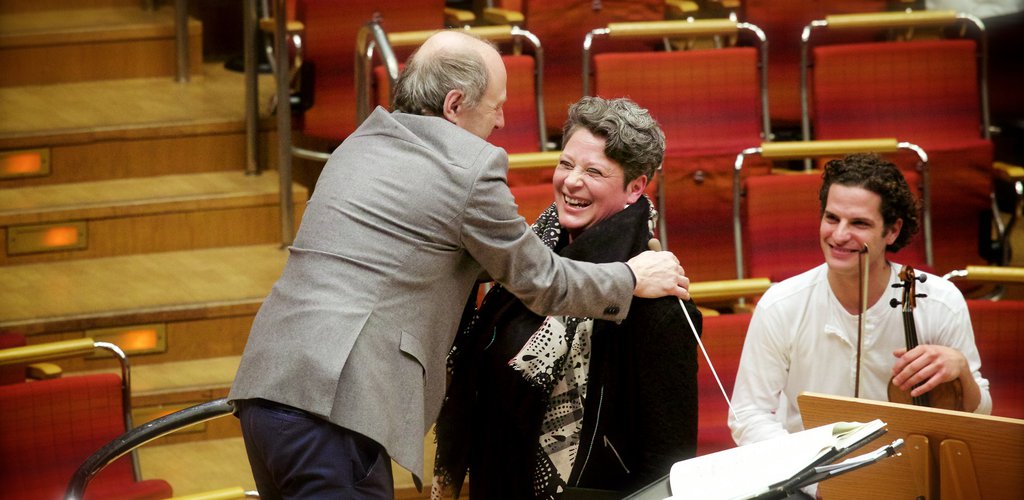The Budapest Festival Orchestra and Iván Fischer have an established reputation as exceptional interpreters of Mahler and this newest recording certainly affirms that reputation. A critical review by David A. McConnell in The Classical Review.
Only a few weeks ago, I wrote enthusiastically about Pentatone’s new “Das Lied von der Erde” recording, conducted by Vladimir Jurowski. I came to it with a few concerns, based on Jurowski’s previous Mahler performances, but those worries were swept away by his keenly perceptive reading. The Berlin Radio Symphony Orchestra plays with impressive fire and refinement, and Sarah Connolly’s singing in the final movement is deeply poignant. It is a valuable addition to the Mahler discography, one I felt would remain unchallenged for quite some time.
Yet here we are, just a few days later with another recording, featuring the same tenor, Robert Dean Smith, and contralto Gerhild Romberger, who also appears on Fischer’s recording of Mahler’s third symphony. The Budapest Festival Orchestra and Iván Fischer have an established reputation as exceptional interpreters of Mahler and this newest recording certainly affirms that reputation.
The orchestral playing is superb: refined, impassioned and abundantly characterful. The opening horn calls thrill, as do the chortling woodwind. The strings negotiate Mahler’s demanding lines with unanimity and a barely contained ferocity. Sample the playing from 3’40” (track 1), the sounds of nature tellingly evoked, or the masterful build-up to the movement’s climax (6’43”), Dean Smith’s depiction of the ape’s howl sending shivers down one’s spine.
Impressive too is that despite a particularly fast tempo (Fischer is roughly 30 seconds faster than Jurowski), Dean Smith sounds fresher, the difficult tessitura managed with greater ease, than in Jurowski’s (live) recording – surely the benefit of being a studio production.
A comparison of these two new recordings is fascinating: both orchestras play with accuracy and fervor. Both groups accompany the many orchestral solo and vocalists with great sensitivity. Fischer and Jurowski expose lots of inner orchestral detail without ever sounding mannered or losing a sense of the music’s architecture. The most significant difference is in the sound itself: while the Berlin Philharmonie allows for clarity, it does not offer the same warm ambiance found in the Budapest Palace of the Arts. Consequently, the Budapest Festival Orchestra has a plusher refulgent sound.
So, in “Der Einsame im Herbst” (track 2) the Berlin orchestra accompany with a gossamer fragility, whereas in Budapest the accompaniment is lusher, more rounded (surely at Fischer’s request) and therefore more soothing. These different colorations summon dissimilar subtleties from the text and its musical setting. In the Jurowski/Connolly’s “Der Einsame,” the need for “rest and refreshment” is felt more acutely, and we are unsure she will find it, in part because of the delicateness of Berlin’s accompaniment. Romberger, perhaps responding to the richer tonal coloring Fischer elicits from his Budapest players, seems already confident that rest and refreshment will come.
It also proves interesting to hear Robert Dean Smith’s two interpretations side by side. In Pentatone’s recording he sounds more emotionally engaged, perhaps because his interpretation had grown in the two years since the Budapest recording sessions. Yet it is surely also because Berlin is a live performance. Indeed, this is a reason many listeners prefer such recordings, seeking the tangible increase in energy and commitment that often comes in live performances. However, that is not to suggest that Smith’s Budapest interpretation is less affecting. In the studio he meets the considerable demands of Mahler’s music with greater ease and aplomb. Diction is crystal clear, and one hears a greater variety of vocal color, as well as a bit more rubato in this reading. Ultimately both recordings are impressive.
It is perhaps the last movement that will divide opinions. Romberger’s interpretation does have an emotional distance that could be perceived as one-dimensional, but that is not how I experienced it. Ferrier, Ludwig and Baker, in their classic performances, take us on an emotional journey to accept our own mortality. While Connolly is not as overtly emotive as her three predecessors, her reading still connects us to that struggle for acceptance. But Romberger’s interpretive stance is somewhat unique: she seems to have acceptance from the beginning, which downplays any emotional struggle. Instead of reaching an emotional catharsis at the end, we are already in that state from the opening measures. Her more introverted interpretation and the exceptionally sensitive orchestral playing, leave one feeling consulted and hopeful.
Channel Classics maintains its reputation for audiophile quality recordings: orchestra and soloists perfectly balanced, the overall sound brilliant and rich. Fischer conducts with total authority and complete conviction. While some may disagree with Romberger’s interpretation, I found it moving and will certainly keep this recording (right next to Jurowski’s) on my already over-burdened shelves.
Mahler – Das lied von der Erde
Gerhild Romberger – Alto
Robert Dean Smith – Tenor
Channel Classics, CD CCS SA 40020

